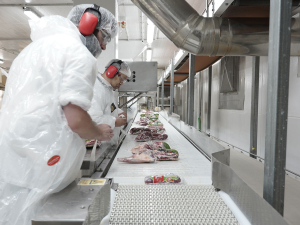Meat Industry Association CEO to Step Down
The Meat Industry Association of New Zealand (MIA) today announced that Chief Executive Officer Sirma Karapeeva has resigned from the role.
 Like many in the primary sector, meat processor say the decision to re-open the borders is positive for the country but is unlikely to alleviate the labour shortage the industry is currently experiencing.
Like many in the primary sector, meat processor say the decision to re-open the borders is positive for the country but is unlikely to alleviate the labour shortage the industry is currently experiencing.
Recent moves by the Government to loosen up the borders have been labelled as too little, too late for most industries in an agri-sector desperate for overseas workers.
The country's agricultural contractors, dairy sector, meat processors and kiwifruit growers have all been underwhelmed by the recent announcements on MIQ border changes.
On February 3, Prime Minister Jacinda Ardern announced that by mid-March the Government will allow overseas workers to self-isolate, rather than go through MIQ.
However, Rural Contractors NZ chief executive Andrew Olsen says for much needed skilled machinery operators this is too late for many contractors.
"Now the cost and uncertainty of MIQ has been removed, that's a very good and positive step to reconnect NZ families," Olsen says. "Unfortunately for most contractors, any arrival from mid-March at earliest, followed by a week of more of self-isolation, will mean it is getting too late for autumn harvest work."
Meat Industry Association chief executive Sirma Karapeeva says the decision to re-open the borders is positive for the country but is unlikely to alleviate the labour shortage the sector is currently experiencing. She says this is especially so with Halal butchers and also due to the proposed median wage threshold set by the Government.
"Without sufficient labour, companies cannot run their processing plants at full capacity. This means fewer opportunities for hard-working Kiwis, often in the regions, to earn a good wage, and longer waiting times for farmers to get their livestock processed. That can have a flow-on impact for animal welfare, farmer wellbeing and the regional economy."
Step two of the changes will, from March 13, allow an expanded border exception for critical workers and skilled workers earning at least 1.5 times the median wage.
Olsen adds that this will mean the border exception visa endorsement through MPI will be reopened to allow contractors to apply to bring in more skilled machinery operators.
In mid-December, the Government approved 200 overseas workers to come in to NZ. Olsen say this process closed on January 20 and wasn't well subscribed because of the mid-March entry dates and the burden of MIQ. He believes most of RCNZ members will have to carry on working long hours and bearing the stresses of being short-staffed.
"We understand that for Government to make these decisions, in the seven and a half weeks since our December 12 green light, to bring in workers is incredibly rapid by their measure," Olsen adds.
"But for contractors, that's half a growing season and nature doesn't wait for the wheels of government to turn. Sadly, crops will be lost and millions of dollars of machinery will continue to sit idle."
DairyNZ chief executive Tim Mackle says in terms of getting workers through the border, the class exception was not achieving its goal of allowing international workers onto farms.
"With a shortfall of about 4,000-6,000 dairy workers, we have asked the Governmentfor a further 1,500 international workers be allowed into New Zealand in 2022."
Meanwhile kiwifruit growers - who face chronic staff shortages as harvest approaches in about a month's time - say any impact from those on working holidays and skilled migrants entering the country in the coming months will be too late for the wider horticulture industry's export of fruit harvest this season.
"Working holiday and skilled migrants entering the country now will not help the summerfruit harvest that has almost finished," says NZ Kiwifruit Growers Inc. chief executive Colin Bond. "It will also have limited benefit for the wine grape and apple harvests that are about to get underway."
He adds that while Working Holiday Visa holders entering New Zealand could go some way to help to the kiwifruit harvest, the extent is unknown and the expectation that a large number would quickly enter the country is highly speculative.
"The horticulture industry has been signalling the chronic labour shortage for harvest and pruning - exacerbated by Covid and closed borders - to the Government for several months," Bond says.
"While we welcome any policy that helps New Zealand's food and fibre sector to recover, this policy change is too late to make a significant difference to this season's harvest."
The Meat Industry Association of New Zealand (MIA) today announced that Chief Executive Officer Sirma Karapeeva has resigned from the role.
The winners of the 2026 Hawke’s Bay/Wairarapa Dairy Industry Awards were announced at the annual awards dinner held at Copthorne Solway Park in Masterton on Thursday evening.
Environment Southland is welcoming this week’s decision by the Environmental Protection Authority (EPA) to approve the release of Blaptea elguetai, a leaf‑feeding beetle that will help control the highly invasive Chilean flame creeper.
This March, the potato industry is proudly celebrating International Women’s Day on 8 March alongside the International Year of the Woman Farmer, recognising the vital role women play across every part of the sector — from paddocks and packhouses to research, leadership, and innovation.
Fruit trader Seeka posted a record profit and returns to shareholders in 2025.
Recent weather events in the Bay of Plenty, Gisborne/Tairawhiti, and Canterbury have been declared a medium-scale adverse event.

OPINION: A mate of yours truly reckons rural Manawatu families are the latest to suffer under what he calls the…
OPINION: If old Winston Peters thinks building trade relations with new nations, such as India, isn't a necessary investment in…